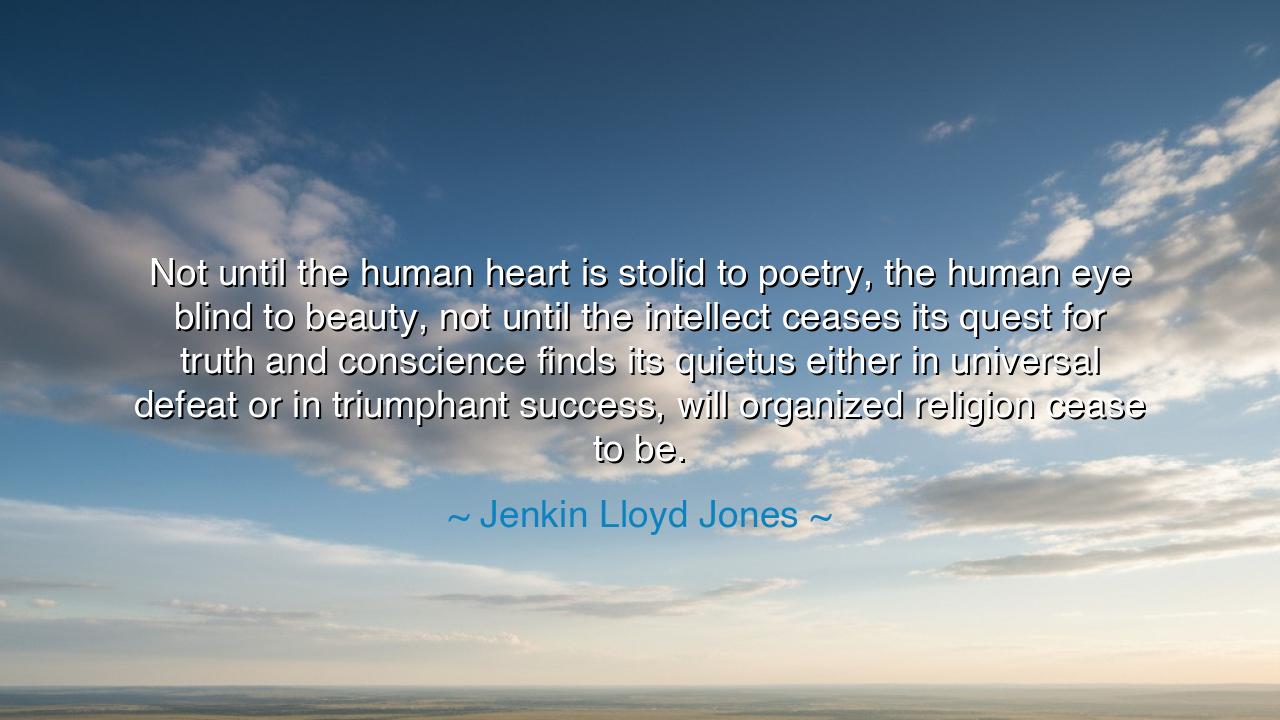
Not until the human heart is stolid to poetry, the human eye
Not until the human heart is stolid to poetry, the human eye blind to beauty, not until the intellect ceases its quest for truth and conscience finds its quietus either in universal defeat or in triumphant success, will organized religion cease to be.






In the grand sweep of time, where civilizations rise and fall like the ebb and flow of the sea, there is one truth that transcends all—organized religion is deeply intertwined with the human soul. As Jenkin Lloyd Jones so eloquently puts it, "Not until the human heart is stolid to poetry, the human eye blind to beauty, not until the intellect ceases its quest for truth and conscience finds its quietus either in universal defeat or in triumphant success, will organized religion cease to be." These words, brimming with the depth of human experience, speak to the enduring nature of faith and religion—forces that arise from the very core of what it means to be human. Religion, in its truest sense, is not merely a set of rituals or doctrines; it is the response of the soul to the profound mysteries of life—to the poetry of existence, the beauty of creation, and the ceaseless pursuit of truth.
The human heart, in its purest form, is never indifferent to poetry—whether it is the poetry of the natural world, the beauty found in human creativity, or the sacred verses that speak to the divine. It is through poetry that we understand the mysteries of the heart and the universe, capturing in fleeting moments that which cannot always be expressed in logic or reason. In this sense, religion arises as a response to the beauty of life, seeking to provide meaning, to explain the ineffable, and to connect us to something larger than ourselves. For as long as the human soul is moved by beauty—whether in nature, art, or sacred texts—there will be a place for religion to answer that call, to offer guidance, and to make sense of the beauty that stirs us so deeply.
Consider the Renaissance, that great flowering of human creativity, where the divine was expressed through magnificent art, architecture, and thought. Think of Michelangelo, whose sculptures and paintings were not just masterpieces of artistic skill but expressions of spirituality, of the human longing to understand the divine. The Sistine Chapel, with its portrayal of Genesis, is a testament to how religion and beauty are intertwined. Michelangelo’s works transcend the mere visual; they seek to capture the very soul of humanity's spiritual journey. In every brushstroke, in every chisel mark, there is a desire to understand truth and beauty, to express the divine in human form. As long as the human heart yearns for beauty, as long as the soul is moved by art and poetry, organized religion will remain relevant, a channel through which this longing can be understood.
At the same time, the intellect’s quest for truth is not a mere academic pursuit; it is the search for meaning, for understanding the very nature of existence. From the ancient philosophers to the modern scientists, the intellectual pursuit of truth has always been a driving force that challenges humanity to look beyond the material and seek the spiritual. Socrates sought truth through dialogue, Plato through philosophy, and Einstein through the theory of relativity. The quest for truth is both a scientific and spiritual endeavor. As long as the human mind seeks to understand the deepest mysteries of the cosmos, whether through reason or faith, religion will endure as a tool for exploring the ultimate questions of existence.
The final aspect of Jones’ quote speaks of the conscience—the moral compass that guides human actions. When conscience finds its quietus—whether in universal defeat or triumphant success—it speaks to the very foundation of religion. If humanity were to abandon its sense of right and wrong, if the moral fabric of the world were to crumble, religion might no longer find a place in the human heart. But as long as humanity grapples with questions of morality, good and evil, and justice, religion will remain, offering a framework for understanding these forces. It is through religion that humanity has sought to answer the call of conscience, to establish laws, and to define the purpose of existence. Even in the face of suffering, faith offers the possibility of redemption and the hope of spiritual fulfillment.
Consider the life of Martin Luther King Jr., a modern example of someone whose actions were deeply rooted in both the moral conscience of humanity and the religious tradition that shaped him. King’s struggle for civil rights in the United States was not simply a political fight; it was a fight rooted in the belief that all people are equal in the eyes of the divine. His faith in the truth of justice and equality drove him to confront the forces of hate and injustice. His religion was not confined to churches or doctrines; it was woven into the very fabric of his fight for justice. Through his actions, King showed that religion is not just a personal belief but a powerful force for societal change.
In conclusion, the lesson of Jones’ words is profound: organized religion will never cease to be as long as the human heart is moved by beauty, the intellect seeks truth, and the conscience longs for justice. Religion serves as a bridge between the earthly and the divine, offering a means to understand the world and our place within it. As long as we feel the pull of beauty and truth, as long as we grapple with questions of morality and meaning, faith will continue to shape and define the human experience. Let us then nurture our hearts with beauty, our minds with truth, and our souls with faith, knowing that these are the pillars upon which our existence is built.






AAdministratorAdministrator
Welcome, honored guests. Please leave a comment, we will respond soon